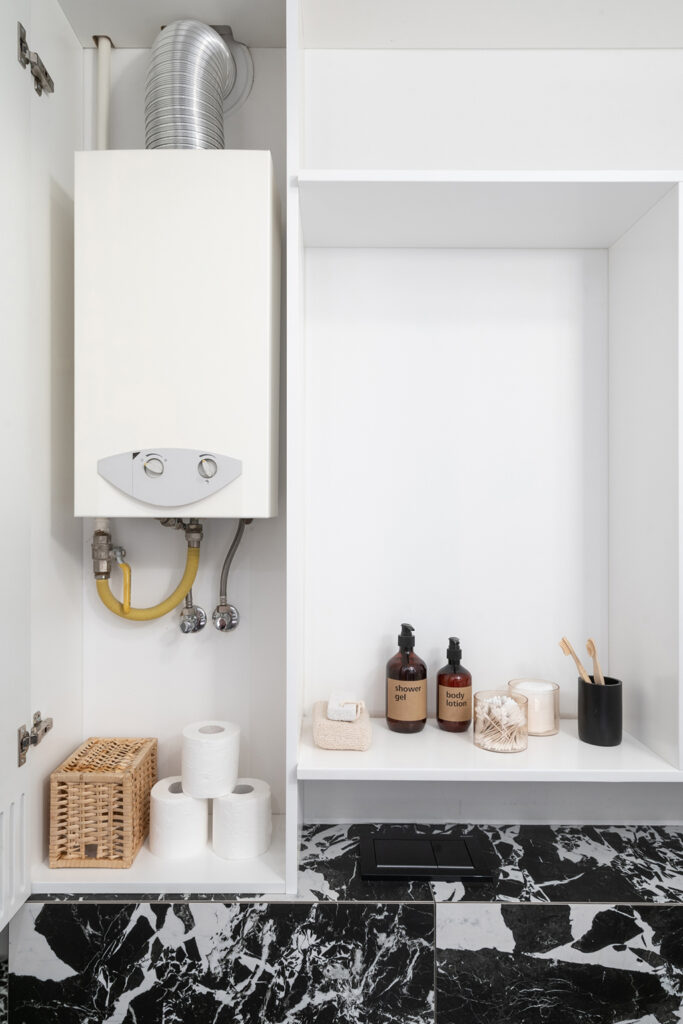Water heater installation is a complex and lengthy process, requiring specialized tools and intricate knowledge of plumbing and electrical systems. Preparing for the installation process goes a long way toward ensuring a seamless and efficient installation.
Here are some tips on preparing for a water heater installation in your home.
Disable the Electricity Supply
First, you’ll want to disconnect the electricity supply from the water heater. All you have to do is open the circuit breaker panel and disconnect it from the main line. That way, you can retain electricity throughout the rest of the house and allow the plumber to work safely on the water heater. Next, disconnect the wires on top of the water heater and use a multimeter to ensure they’re not live.
Clear the Area Around the Water Heater
Clearing the area around the water heater ensures the plumber has enough working space. Physical intrusions can significantly compromise the quality of the plumber’s work and lengthen the installation process.
Get rid of any furniture, carpets, and other items that block the water heater. Next, take out any rugs or mats that can interfere with the plumber’s footing. Lastly, clear any debris to ensure a clear working space.
Ensure Adequate Ventilation
A clean, well-ventilated space provides a conducive environment for the plumbing technicians to work efficiently. Make sure that any windows around the water heater are open and that there is enough airflow for the plumber.
It’s worth noting that water heaters produce a lot of condensation during operation. Proper ventilation helps get rid of this condensation to ensure the heater runs efficiently and prevents the buildup of excess moisture. Too much moisture could promote the growth of mold and other fungi in your home.
Gather Basic Household Tools
Professional plumbers come well-equipped with tools, but providing basic household tools is also great. These include screwdrivers, wrenches, pliers, and a pipe wrench.
This saves the plumber from making too many trips to their vehicle for tools and supplies. Also, this helps you better understand what type and size tools work best for your specific heating system. However, you don’t have to buy these tools if you don’t have them. Your plumber will certainly come with their own.
Drain the Heater Tank
The water heater tank stores heated water from the heater before distributing it to different rooms. Drain all the hot water from the tank beforehand to reduce the load on the plumber.
Attach a garden hose to the drain valve on the water heater’s bottom. Turn the spigot and drain until the tank is empty. Alternatively, you can turn off the water supply to the heater and wait for the tank to drain completely.
Telltale Signs It’s Time to Replace Your Water Heater
Over time, wear and tear will render your heating system non-functional and you’ll probably require water heater installation. Here are a few telltale signs that your heater needs replacement.
It’s More than 10 Years Old
Aged water heaters are not only highly inefficient, but they’re also more expensive to repair and maintain. As a rule of thumb, replace your water heater after ten years of continuous use, even if it works fine. Retaining an old heater only increases your utility bills and exposes you to a higher risk of failure.
Strange Rumbling Noise
Calcium builds up and collects at the bottom of the tank with continued water heater use. This calcium hardens, creating a layer of insulation that rumbles when heated. Flushing the tank should solve the issue, but persistent rumbling means it’s time to arrange for water heater installation.
Rust Colored Water
A steady flow of rusty-colored water from the taps indicates corrosion inside the tank. Check for discoloration by running cold water and checking for discoloration. Discoloration means that you have rusted galvanized pipes. No discoloration means your water heater tank is to blame for the rust. If so, arrange for prompt water heater installation to get clean, hot water.
Stagnant Water Around the Base of the Water Heater
A water heater leak can occur when corrosion, rust, or age compromises the tank’s integrity. If you notice a pool of stagnant water around the base of your unit, it could indicate a major leak in your heating system.
These leaks translate to hefty water bills and, in severe cases, may compromise your home’s structural integrity. You could always repair the leaking pipe, but persistent leaks mean you need to replace your water heater.
The Water Smells Weird
If your water smells like rotten eggs or sulfur, the anode rod is likely corroded away because of persistent use from high hot water demand. The anode rod helps prevent corrosion in the tank by drawing corrosive elements to itself. A worn-down anode rod cannot provide this protection, leading to rusting and bacteria accumulation.
The foul smell results from contaminants and excessive sulfur-producing bacteria in the water heater tank. Replacing your water heater solves this problem permanently.
A Lack of Hot Water
This is an obvious sign that you must arrange prompt water heater installation and discard your old one. The lack of hot water could stem from inadequate insulation, a gas leak, or issues with the water supply valve. This is a common problem for most homeowners, but if it happens too often, you need to replace the water heater to break the endless break-and-repair cycle.
Arrange Your Water Heater Replacement Today
Water heater installation is a challenging task, but preparing for it makes the job much easier for the plumber. Be on the lookout for signs of deterioration in your water heater, and arrange for water heater installation if you spot any. That way, you can avoid emergency repairs and costly water bills.
Contact Clarksburg Plumbing in for professional water heater installation. Our team of licensed and experienced plumbers will be happy to ensure a consistent supply of hot water in your home.
See our most recent blog on this topic here.
Photo By brizmaker at istock










